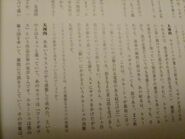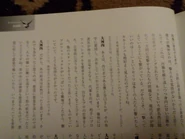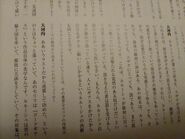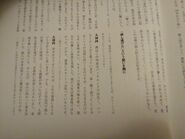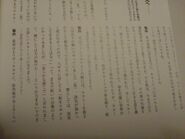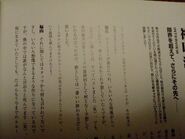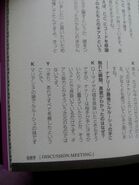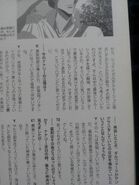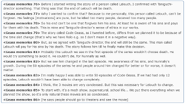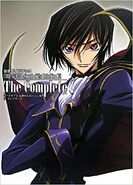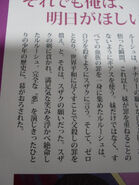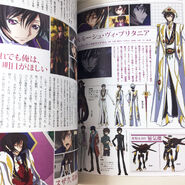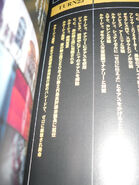There is a discussion in the fandom ("Lelouch, alive or dead?") which has been raging for a decade, but unfortunately this discussion has been muddied by a tidal wave of misinformation and falsehoods, especially concerning what was or wasn't officially stated by the show staff. Therefore, a list of all the official statements which have been made in regards to the topic of Lelouch's true fate at the end of R2 can be found below.
Interviews, Articles and Live Commentary
Interviews
'Continue' vol 42, (October 2008)
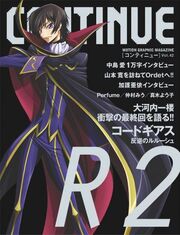
Continue Vol.42 (2008)
Ichiro Okouchi, "Lelouch dead!? Was it a good one or a bad one!?"
- Still, isn't it possible that defeating the wise ruler Schneizel, the person who was supposed to have brought order to the world, might lead to some [viewers] interpreting it as a Bad End?
Okouchi: That's true. There are probably a lot of people who think of it as a Bad End, a tragedy, considering the protagonist's, Lelouch's end as well. However, Lelouch says in the first episode: "Only those prepared to be shot are allowed to pull the trigger themselves." If you were to think of that as his pride, then I think his getting shot (killed) in the end was a logical end. Of course, I understand that not all of the viewers will accept this ending. There were people who wanted a happier ending, after all.
- Was there a dispute among the staff members regarding the ending?
Okouchi: No. It was decided fairly naturally. During the "Code Geass" script meetings, there are many cases in which there were a number of disputes, but there were barely any when it came to the scripts for (the previous series's) episode 25 and the final episode. I think everyone felt the same when it came to the end of the character that is Lelouch.
- Why were you so bold as to choose this ending when the viewers might see it as a Bad End?
Okouchi: Bold... yes, we were so bold as to chose this ending. Perhaps the show that is "Code Geass" ending up this way was decided the moment Director Taniguchi and I teamed up. I suppose you can call it our sense of aesthetics, or perhaps a part of our psychological makeup.
- I see. So Lelouch's decision was also your, Mr. Okouchi's, and Director Taniguchi's decision.
Okouchi: Which is why I think of both our and Lelouch's decision as Happy Ends. I believe that there will be better things in the tomorrow awaiting Nunnally, Kallen and the rest who have been left behind. And surely Lelouch, who was able to make this into a reality, can only be happy [about this].
- Some unresolved mysteries still remain.
Okouchi: From the very beginning, [I/we] never planned on explaining everything. In fact, if you ask me, I think we might have overdone the explanations. While it's undeniable that Lelouch's story has ended with a full stop, the other characters' stories are still on-going, and it's not like the world [of Code Geass] itself has come to an end either. [I/we] didn't want to end it by closing it up for good."[1]
Animage 10 (Oct 2008), 11 (Nov 2008)
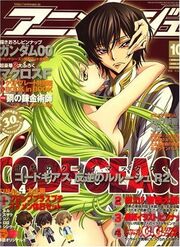
Animage 10 (2008)

Animage 11 (2008)
Floating text: "C.C. - Her wish was to die as a human, but after spending time with Lelouch, C.C. also wished for tomorrow. She made up her mind to ensure the tomorrow of the world that Lelouch had left."
- Animage: The ending's outcome turned out as such, but do you think Lelouch was happy?
Okouchi: I think that this (work) was not a bad end, but a good end. This already appeared in Lelouch and C.C.'s conversation in Stage 7 of S1, but people who are 'just' living their lives are uninteresting. Lelouch saved his beloved sister and made the kind world that he envisioned, a reality. His life was not in vain. That's why, Lelouch was smiling in the end."
Okouchi: (...) That end is to Lelouch and to Suzaku both the punishment and the salvation at the same time. It's also connected to the words Lelouch said at the beginning: "Utte ii no wa utareru kakugo no aru yatsu dake da." The person who gave the punishment was punished themselves and if you want to get the salvation, give the salvation first. Of course it's also the same with Lelouch's decision to accepts the geass (wish), because he geassed many people, as he himself has said in the show. [He refers to the last episode when Lelouch says what the people of the world wish for]
- Animage: So you accept the end of the show?
Fukuyama: I think that before he reached that final scene, Lelouch had many possibilities to choose from. But he understood very well what he had done and had to pay the price for that. Suzaku choose to live as Zero and was awarded the opportunity to pay for his sins by this choice. And Lelouch got his salvation by choosing not the happiness of living on but to sacrifice his own life to create the situation for the world to move forward. If you think about his character, I don't think he would still be himself, if he chose other end. [1] [2]
Mook Animedia (28 January 2009, p.89-90)
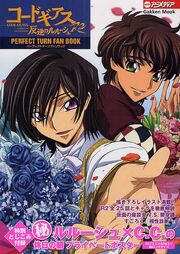
Mook Animedia (2009)
Q: "How did Nunnally managed to realize Lelouch true intention, when she touched his hand at the end?"
Staff member K: "The way Nunnally can tell that someone is lying, just like she was able to tell that Lohmeyer was lying to her, is that she can feel the hand of the person she is talking to is sweating or lightly trembling. It's nothing like Geass or some special ability like that."
Staff member Y: "Yes. So, she simply came to conclusion [Lelouch was lying] by herself, because of this ability."
Staff member K: "She is Marianne's daughter and Lelouch's little sister. Two months have passed since that defeat of Schneizel and for this two months she's been wondering constantly about what had happened, like "why it happened?" and so on. So when she touched Lelouch's hand at the end she felt that he is calm, she put the two and two together and realized the truth. Of course, we know that in anime, it's hard to explain things like that, but yeah, please accept it like this kind of "romantic"(*) idea" we had." [3]
(*) the word "roman" is used here. It means something one finds beautiful in general
Articles
C.C.'s profile on GeassNet
"..Knowing that Lelouch does not hate her for giving him the Geass, she is now able to show her true feelings. With the realization of "Zero Requiem", her time with Lelouch, who was able to forgive and accept her, came to an end, but the memories created with him has, without doubt, saved her from eternal loneliness."[1]
Live Commentary
The release of the Code Geass movies was accompanied by various Code Geass related events, some of these were live interviews and live commentary. The following are excerpts from commentaries given by Okouchi, Taniguchi-producer and two other producers when they talked about the scene where Lelouch attempted to geass his father. This was documented by people who were present at these events:
パパんにギアス掛けるシーンも、「これギアス掛かってないのに死んだふりするんだよ」「息子を驚かせようと」「ルルーシュくんかわいそう」「これ一番ショックなタイミング計ってるよね」「絶対笑いこらえてるよ」って色々言われてて笑った。[4]
Translation: About that scene Lelouch geass his dad I laughed because they said like "He isn't geassed, just pretends he dies!" " He tries to surprise his son!" "Poor Lelouch" "He tries to choose the most shocking timing, doesn't he" "I'm sure he tries hard not to laugh"
コウジロウさん「この人、ギアスかかってない じゃないですか。よく我慢してますよね。こことか 絶対笑い堪えてますよ」[5]
Translation: "He isn't under an influence form Geass, is he? He's good with pretending, sure. I'm sure he tries his hardest not to laugh right now."
Tweets
In light of the release of the 3 new movies, Ichirō Ōkouchi started a series of tweets called "Geass Memories". In these he looks back at the days when he and his colleagues were making Code Geass and sheds some light on the production process, gives old anecdotes and so on.
In the most recent of these tweets (May 21, 2018), he officially confirms that Lelouch's fate had been decided from the very start and that this fate was death.
These are the relevant quotes [6] [7]:
- "Before I started writing the story of a person called Lelouch, I confirmed with Taniguchi-director something. That thing was that the end of Lelouch will be death."
- "At least he is aware of his sins and pays for them with his death."
- "This man called Lelouch will pay for his sins by his death. The story follows him till he finally make this decision."
- "Probably this Lelouch we see in the first episode of the series wouldn't choose death. He would try something to avoid it. He couldn't die, for Nunnally as well. But we see him changed in the last episode."
These tweets confirm that there was no disagreement between the creators when it came to the death of Lelouch (see Notes below). They also confirm that his death was decided on from the very start of the production process, even before the writing had started. And finally, these tweets are truly very explicit, the word "death" here can really not be interpreted as "death for a minute or so".
The Official Guide Book
The "Code Geass Lelouch of the Rebellion R2 The Complete Official Guide Book Art book"[8] repeatedly states that Lelouch is dead:
- "Lelouch, who gathered not just his sister's but the sins of all of his kin, tells Suzaku that he wants him to kill him. And, atoning for his sin of killing his father by becoming Zero and devoting himself to world peace. That is Suzaku's wish. Pierced by Suzaku's sword, Lelouch dies with a satisfied smile on his face. The curtains are lowered upon the history of one boy who performed the perfect 'evil' to the end." [9] [10]
- "For those two who bear the heavy sin known as killing their fathers, they share the belief that they can forgive each other by imposing the greatest punishments on themselves. Death for Lelouch who wishes for a tomorrow with his sister, life for Suzaku who wishes to atone for his sins through death. Suzaku, who accepts the weight of Zero's mask, gives his gratitude to Lelouch. For the fact that he can atone for his sins. For the results of fulfilling his own wish." [11]
- "In the end, Nunnally isn't even allowed to bear her brother's sins. Until right before her brother dies, she seems to want to hate him for that. Upon realizing the truth behind her brother's actions, Nunnally clings to her brother's corpse and wails. And then, she succeeds her brother's will and starts walking together with Suzaku, who has become Zero, down the road as a ruler who creates peace. Because that alone is the one and only thing she can do for her brother." [12]
- From the time line chart: "Emperor Lelouch, during the parade before executing the rebels in Japan, is attacked by Zero and perishes."
- Turn 25: "However, Suzaku, masquerading as Zero who is thought to have died in the war before, appears and stabs Lelouch to death with a sword in front of the crowd." [13]
The New Epilogue (ZR Blu-ray)
The official blu-ray release contains the "Zero Requiem movie" which recaps R2.
This ZR movie is the same as R2, but has a 50sec new epilogue.
The old epilogue with C.C. on the hay cart scene is dropped and replaced by a new epilogue where C.C. narrates to the audience while beautiful art scrolls past in the background.
C.C.'s narration: "A young man dies. He had the power to change the world, to create a new order. The world feared him, hated him. But, I know he died with a smile on his face. Only those who have realized their dream will truly understand that feeling of utter contentment. So, this is not a tragedy. And whenever I feel sad or cry at night, I sing a song. A song of man's making. Zero Requiem!" [14]
Notes
Misinterpretations and misrepresentations of the interviews
- The interpretation "they said he died, but they didn't say he stayed dead, maybe the code just brought him back to life" is a fallacy because these interviews were given BEFORE the airing of the final episode. The anime magazine Continue (Vol.42) and Animage 10 were lying in the shelves of shops about 2 weeks after the final episode had aired and it is not logistically feasible to shedule interviews, write the articles, edit them, sort the layout, make it fit in the magazine, print it, etc so shortly before nationwide distribution. On top of that, whenever they speak about the fanbase and its reaction, they talk in the future tense. It's impossible for the creators to foresee and predict all possible fan reactions, they didn't say that Lelouch didn't have the code or didn't get back up after dying because they never expected that to be the thing that fans came up with. For them death is final, so they didn't say what happened after death, because there's nothing there. Nobody would say "he died and after that he stayed dead". this is corroborated by the tweets (see that section) which repeat very explicitly that Lelouch is dead. Furthermore, the fact that there is not a single official statement which has ever said that Lelouch was immortal or had the code also corroborates that this interpretation is a fallacy.
- The interpretation that Code geass was intended to be open ended is false. This was a (deliberate?) misinterpretation of an interview. The interview said that they would understand if not all fans would like the ending, and that people were free to see Lelouch's death as a happy or a sad ending. Lelouch's death itself, however, was not open to interpretation. Not everything in an anime is open to interpretation, for example Lelouch being a Britannian prince and not a Japanese schoolgirl, likewise with his death, it is set in stone.
- The claims that the show staff were internally divided on the issue and that's why the anime ended ambigiously are false. The interview says very clearly that even though there were disagreements on some story elements there were none when it came to the death of Lelouch, his death was unanymously decided. This was later repeated in one of the tweets (see that section). They even explained how they added foreshadowing about his death to the show with Lelouch's famous lines about killing and being killed. Lelouch says this in the very first episode, repeats this sevral times throughout the show and says it one final time right before he gets stabbed. This demonstrates there were no disagreements at all and that the ending was not intended to be ambigious.
The change in epilogues
- The hay cart scene in the old epilogue was claimed to be a crucial 'clue' for the code theory. If that scene were truly so important to understand the story it wouldn't have been dropped. Since it IS dropped this is very telling.
C.C.'s words in the new epilogue are very clear and cannot be misunderstood. Lelouch is dead and she is sad and heartbroken about it, but the thought that he died achieving his goal comforts her. It's worth pointing out that this new epilogue fits perfectly with what they said about the ZR and C.C. in an interview (see Interview section).
Unlike the fan-made fake edit of the old epilogue which "shows the cart driver as Lelouch" which can only be found on shady code theory youtube channels and nowhere else, this new epilogue can be found on many places, most importantly its is included on the official ZR blu-ray and anyone can just buy it and see for themselves. It can also be found on various streaming sites which host the entire Code Geass franchise (so not solely R1 and R2). And unlike the fake hay cart scene which has TERRIBLE quality because it's a mere zoom with some edits, this epilogue has beautiful, high quality art and actual voice acting by C.C.
Lelouch of the Resurrection
With the release of the final of the three new movies it was revealed that "the new project" Resurrection will follow the movies and not the original series. These 3 movies largely follow the original series, the differences are mostly minor, a few things less minor, but apart from one thing there's nothing massively different. There is one BIG change, almost all of the original Shirley stuff has been cut, and replaced with new scenes. As a result, Shirley is still alive at the end of the movies.
There are 2 conclusions to draw from this:
- Since "Lelouch of the Resurrection" is now official an AU (alternate universe), it doesn't affect the ending of the original R2.
- At the moment of this writing (after the release of the final movie, but before the release of the sequel), everything shows that, despite being AU, the movies didn't alter Lelouch's fate, i.e the ZR still happens and Lelouch still dies. So that means the discussion about the end of R2 is still relevant for the sequel, until the sequel (if ever) contradicts it. In that light it is clear why the sequel is named "Lelouch of the Resurrection": Lelouch (who is confirmed to be the main character again) will be resurrected from the grave.
Further Reading (evaluation code theory)
There is a compilation post on reddit which gathered all the official statements (part 1), as listed here, and also analyzes the various code theories (part 2) and demonstrates where the anime istelf contradicts them. Since that second part only deals with fan theories, it was not included here.
Gallery
Links & References
- ↑ 1.0 1.1 1.2 AnimeSuki Forum - (2) The Proof Is in the Pudding
- ↑ imgur.com
- ↑ imgur.com
- ↑ Imgur.com
- ↑ Imgur.com
- ↑ 大河内 一楼 on Twitter
- ↑ Imgur: 大河内 一楼 on Twitter (Translation)
- ↑ Code Geass Lelouch of the Rebellion R2 The Complete Official Guide Book Art book Amazon.com: Books
- ↑ imgur.com
- ↑ Cloudfront
- ↑ imgur.com
- ↑ imgur.com
- ↑ imgur.com
- ↑ Youtube



